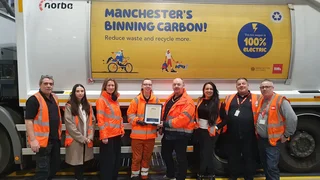
With so many routes into engineering, you may be struggling to decide between an engineering apprenticeship or other qualification routes, such as a university degree.
While engineering accounts for 19% of all jobs in the UK, it’s always a good idea to get your foot in the door early, and what better way to do this than an apprenticeship?
In this article, we’ll discuss both the long-term and short-term benefits of engineering apprenticeships. Read on to discover what’s on offer and kickstart your career today with us!
What is an engineer?
An engineer is someone who designs and builds complex products, machines, systems, or structures. Engineers solve problems by using science, maths, and technology to figure out the best way to create new things or to improve a product.
Essentially, an engineer is a problem-solver who uses creativity and scientific know-how to design and build things. They might develop products like smartphones and other devices, or work on large-scale projects like bridges or power plants.
In short, engineers make our world function smoothly by bringing ideas to life. No matter the field, all engineers share a passion for innovation and helping to improve the world around them!
What engineering roles are there?
Engineers can work in many industries, including:
-
Food
-
Rail
-
Water and energy supply
-
Construction
...and many more!
Engineers often specialise in a specific branch, such as civil engineering, electrical engineering, mechanical engineering, or chemical engineering.
Engineering roles range from entry-level Operator roles to mid-level Engineering Technician roles, to senior roles like Chief Engineer.
I wanted to gain on-the-job experience while completing the engineering qualifications and coursework, and Total People seemed to offer this the best.
Total People Engineering Apprentice, working with Sodexo.
The top benefits of engineering apprenticeships
1. Gain experience with employers & accelerate your career
With an engineering apprenticeship, you’ll spend up to 80% of your time working with a relevant employer in the engineering sector, gaining first-hand experience and making valuable connections that can support your employment and career progression once you have achieved your qualification.
Most employers recruit their apprentices as full-time staff once the apprenticeship has been completed, since they’ve already invested time and effort into developing the perfect skills for the business.
2. Start with minimal entry requirements
Our engineering apprenticeships are Level 3 qualifications, which are often more suitable than engineering degrees and other engineering qualifications for those with lower A-level grades since the entry requirements are simply passing your GCSE grades.
3. Earn while you learn
While an engineering apprenticeship lasts at least as long as a degree (three years), you have the added benefit of earning an apprenticeship wage while you learn and no tuition fees to pay – in fact, your qualification will be funded (at least in part) by the apprenticeship levy.
4. Network & build industry relationships
Working alongside experienced professionals provides unparalleled opportunities to learn from their expertise and gain insights you wouldn't find in a textbook. These connections can blossom into mentorships, friendships, and references, opening doors for exciting job opportunities and collaborations down the line.
As you navigate your engineering career, a strong network becomes an invaluable asset, so start building it early through your apprenticeship!
5. Guided support
Unlike traditional classroom settings, engineering apprenticeships offer a unique blend of guided learning and personalised support.
You'll receive a structured curriculum that ensures you gain a strong foundation in the theoretical aspects of engineering.
This is complemented by practical projects and on-the-job training, allowing you to see the theory come to life.
You'll also have a dedicated tutor; a seasoned engineer who acts as your mentor. They'll provide one-on-one guidance, answer your questions, and offer valuable insights based on their experience, so you won’t feel alone in your learning journey!
6. Develop valuable soft skills
Soft skills are essential for any job role. Many young apprentices may not have the soft skills needed to enter the workforce, and apprenticeships are the perfect way to gain them. Here are some soft skills an engineering apprenticeship can help you acquire:.
-
Communication: Apprenticeships help develop strong communication skills, both written and verbal. You'll learn to effectively communicate technical information to colleagues, clients, and supervisors.
-
Teamwork: Apprenticeships provide opportunities to work in teams, develop strong teamwork skills, and learn to contribute effectively to group projects.
-
Problem-solving: Engineering challenges require creative problem-solving. Apprenticeships provide hands-on experience in identifying, analysing, and resolving complex issues.
-
Time management: Juggling work responsibilities and study demands teaches valuable time management and organisational skills.
-
Professionalism: Apprenticeships instil a strong work ethic, punctuality, and professionalism in the workplace.
7. Gain industry recognised qualifications
Engineering apprenticeships lead to valuable qualifications that employers are looking for, like apprenticeship standards or BTECs. These qualifications show that you have the skills and knowledge you need to work effectively, and, as a result, improve your employability.
Employers are always on the lookout for people with these qualifications because they know you have a strong foundation in engineering. This means you'll have better job opportunities, the potential to earn more money, and a great starting point for further learning and career advancement.
8. Contribute to a better future
Engineering plays a pivotal role in addressing global challenges, from climate change and sustainable development to technological advancements. As an engineering apprentice, you contribute to these critical societal goals by developing the skills and knowledge needed to innovate and create a better future. You'll be part of a dynamic field that shapes our world, leaving a lasting positive impact on society for years to come!
9. Learn for free with an engineering apprenticeship!
Engineering apprenticeships offer a unique opportunity to "learn for free" by combining paid employment with structured training. You won't pay tuition fees, and instead of accumulating student debt, you'll earn a salary while gaining valuable on-the-job experience. This allows you to invest in your future without the financial burden of a university degree.
Choose Total People for your engineering apprenticeship
Engineering is an increasingly competitive field to break into, so why not give yourself the advantage of a wage, hands-on experience, and industry connections by completing an apprenticeship?
When you choose Total People for your engineering apprenticeship, you're choosing a partner with a proven track record of success. We have strong industry connections, allowing us to place you with leading employers in the engineering sector.
Our team of expert apprenticeship advisors provides excellent support throughout your journey, guiding you every step of the way. With our focus on developing the next generation of engineering talent, we're confident that we can help you achieve your career goals.
Take a look at Total People’s engineering apprenticeships to get your career started.

Our Apprenticeship Paths
Total People offer apprenticeships in a variety of different industries.
Explore

